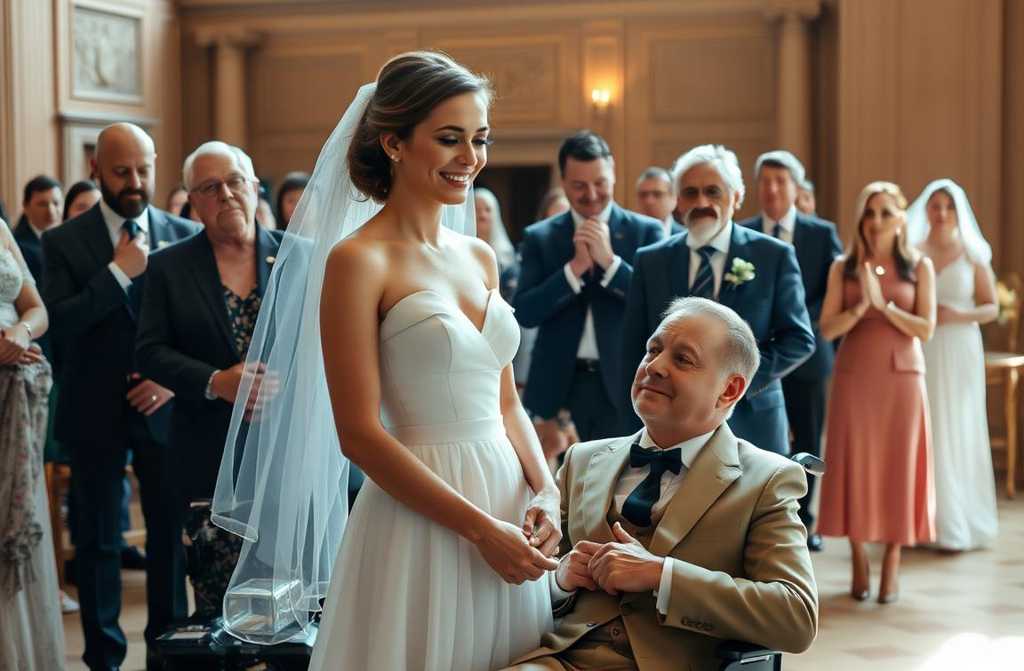**Diary Entry**
When Emily announced she was marrying a man with a disability, the room fell silent. Her family was stunned, her friends lost for words, and even distant relatives gathered as if discussing a national crisis. Everyone felt compelled to intervene. Youre throwing your life away, You could do so much better, What will people say?the warnings came thick and fast.
But Emily, a 27-year-old pharmacist with first-class honours and job offers from Londons top hospitals, stood firm. For once, she wasnt choosing what others deemed rightshe was choosing what felt true. And that truth was Daniela man in a wheelchair whom most people pitied but seldom respected.
Once, Daniel had been someone to admire. A coach, an athlete, a leader in youth sports. Anyone involved in athletics knew his name. But everything changed after the accident. On his way home, a drunk driver ploughed into his car. Daniel survived, but his spine was shattered. The doctors were blunt: permanent paralysis.
From that day, his life divided into before and after. Training sessions became physiotherapy. The roar of the crowd was replaced by hospital silence. He stopped answering calls, vanished from social circles, retreated into himself. His smiles were automatic; at night, the care staff said, he wept like a man reliving the moment the doctors delivered their verdict.
Emily arrived at the rehabilitation centre through a university volunteer scheme. She resisted at first, argued with the coordinator, but eventually agreed. Thats where she first saw Danielalone in the garden, a book in his lap, utterly detached.
Hello, she said. He didnt reply.
She returned the next day. Still, he stayed silent.
Yet something in his quietness drew her inthe weight in his gaze, the rawness of his pain. One afternoon, she simply sat beside him and murmured, You dont have to speak. Ill stay anyway.
And she did. Day after day. Sometimes in silence. Sometimes reading poetry aloud. Slowly, he began to openfirst with glances, then a smile, then brief words. Eventually, conversation flowed. What grew between them wasnt just attractionit was something deeper.
She learned he wrote poetry, that he dreamed of publishing a book, that he missed dancing most of all. And he realised Emily wasnt just brilliant or beautifulshe had a strength that could embrace not just his body, but his grief.
Their love unfolded quietly, not out of secrecy but from a desire to protect what they had. Still, such things cant stay hidden.
When Emily told her family, the backlash was instant. Her mother shut herself away, her father accused her of chasing tragedy, friends grew distant. Even colleagues at the hospital kept their distance.
Youre ruining your life, they said. How can you be with someone who cant even stand?
Emily didnt argue. She simply said, I choose love. Not the kind that demands perfection, but the kind that sees me as I am.
They planned a small weddingjust those who understood, or at least refrained from judgement.
On the morning of the ceremony, Emilys mother finally spoke. No shouting, no accusationsjust one question.
Why him?
Emily answered softly, Because he never asked me to pretend. He loves the real me. Thats worth more than words.
At the wedding, Daniel waited in a crisp cream suit, his cane resting nearby. But no one expected what happened next.
Emily walked inradiant, fearless. Then Daniel stood. Slowly, unsteadily, but he stood. One step. Another. A third.
I wanted to stand for you, he said, gripping a chair for balance. Even if just today. You gave me the strength to try.
Later, they learned hed been secretly working on rehabilitation for months. He hadnt wanted to raise false hopeonly to meet her as an equal, a man worthy of standing by her side.
Now, Emily and Daniel run a charity supporting people with disabilities. They speak in schools, rehab centres, hospitals. Their story isnt about pityits about defiance. For anyone who still believes disability is the end, or that love must fit neatly into societys expectations.
When asked if she regrets it, Emily touches her wedding ring and smiles.
I didnt marry a man in a wheelchair.
I married the man who taught me courage.
The one who showed me imperfection is human.
The one who believed in me when Id stopped believing in myself.
This isnt a tragedy. Its our victory.
In a world where love is measured by convenience, their union is a challengeto stereotypes, to fear, to anyone who thinks a man in a wheelchair cant be strong, loving, whole.
Can love like this exist? Can it defy expectations?
Yes. Every day, they prove it can.
**Lesson learned:** Love isnt about perfectionits about finding someone who makes you brave enough to be real.







